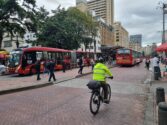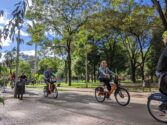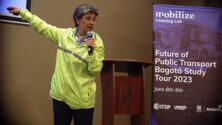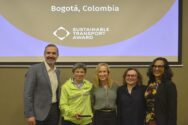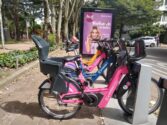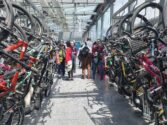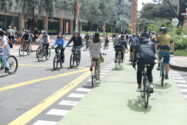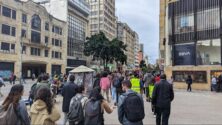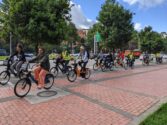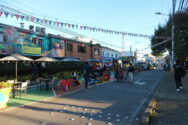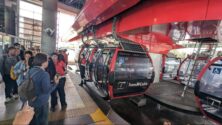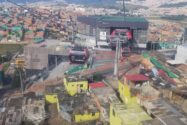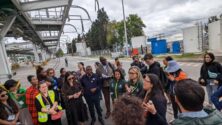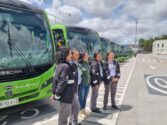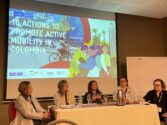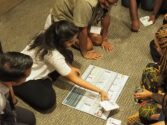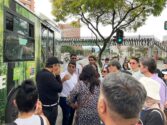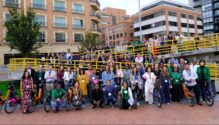June 26, 2023
The City As A Learning Lab: Experiences and Inspiration from Bogotá
For the first time since the pandemic, ITDP and MOBILIZE Program partners convened in-person for multiple days of knowledge sharing, hands-on learning, engagement, and collaboration on the future of sustainable and equitable transport.
Learn more about Bogotá’s comprehensive mobility plans and programs in this MOBILIZE case study.
The MOBILIZE Learning Lab was developed as a space for collaboration and incubation with a focus on advancing solutions for more sustainable urban mobility all over the world. The program seeks to bring transport planners, researchers, and cities engaged with the Sustainable Transport Award (STA) into a unique community of like-minded people seeking to promote more livable cities for all. The Learning Lab is a joint project between ITDP and Volvo Research and Educational Foundations (VREF) and, over the past year, it has focused its efforts on exploring the future of transport through the lens of three critical topics: Funding and Finance, Equity and Transport Justice, and Resiliency. Learn more about these sessions.
In June 2023, staff members from ITDP’s global offices, VREF, the City of Bogotá, and local partners like Despacio and Tembici gathered in Colombia for a week of insightful conversations, interactive site visits, and keynote presentations to learn from the experiences of City officials as well as transport advocates, researchers, and — of course — one another. The focus of the activities were to explore the advancements in sustainable mobility that the city has implemented in recent years, particularly during the pandemic, and to reflect on the Future of Public Transport as a guiding theme for all stakeholders.
Inspiring Speakers and Conversations
An event highlight was the keynote speech from Bogotá Mayor Claudia López Hernández, who accepted the city’s 2022 STA award in-person and presented on her Administration’s comprehensive transport agenda, as well as on the importance of advancing sustainable, inclusive development strategies for her city of nearly 8 million people. Mayor López, the first woman and LGBTQ person to be elected to the position, started her term in 2020 and led the city through the impacts of the COVID-19 pandemic, leveraging the time of crisis to institute a number of quick-response interventions to improve mobility and access and protect the health of citizens. These initiatives include the expansion of the city’s already extensive cycling infrastructure and facilities, a commitment to transitioning to low-emission electric buses, the planning of the city’s first metro system, and a unique focus on ‘Care Blocks’ that provide dedicated support for women and families.
“Bogotá has won the Sustainable Transport Award twice because our city continues to build connected systems of green, transit-oriented corridors that is reversing the pyramid of car-focused roads and gray spaces of the 20th century, all in order to create better environments that focus on the productivity and care infrastructure of the 21st century.”
— Mayor Claudia López
MOBILIZE Learning Lab participants also heard from Maria Villate Gaitán, Government Affairs Director for Tembici (the country’s first bikeshare system) who shared the company’s initiatives to expand throughout the city and promote transit connectivity and inclusion. Launched locally in 2022, Tembici operates over 3,300 bicycles and 300 stations, and also offers e-bikes, hand bikes, cargo bikes, and child seat-equipped bikes. Many stations are also co-located near public transport stations to improve multi-modal commutes, and the system uses the same fare card as the Transmilenio BRT to make connections easier. Subsequent deep-dive discussions led by regional transport experts focused on the evolution of public transport in Bogotá, presented by Dario Hidalgo, and on participatory planning processes to develop the city’s pioneering green corridor, presented by Carlos Felipe Pardo.
A number of city officials from the Secretariat of Mobility and beyond also joined the sessions to engage and collaborate with ITDP and Learning Lab participants, including Deyanira Avila Moreno (Secretary of Mobility); Diego Suarez (Deputy Director of Infrastructure); Susana Morales (Director of Mobility Planning); Alimar Benitez (Director of Mobility Intelligence); and Diana Rodriguez Franco (Secretary for Women’s Affairs). VREF representatives Vanessa Duarte (Research Officer) and Karin Henriksson (Communications Manager) also provided key insights into the organization’s ongoing support for MOBILIZE and urban transport innovation.
Real-World Engagement
It was critical for the Learning Lab participants to have the opportunity to witness and experience for themselves the various transport and urban development interventions that has earned Bogotá global recognition. Walking and cycling tours provided an opportunity to explore the city’s infrastructure — both in terms of historic challenges and forward-looking solutions — and took groups along extensive green corridors like Parque El Virrey, recently revitalized neighborhoods like San Felipe Barrio Vital, and vibrant, pedestrian-focused commercial areas like Zona T and Rosa. In addition, tours offered Learning Lab groups more insight into the city’s efforts to better integrate public transport and land use planning, with a focus on tying transit, pedestrian, and cycling networks together in some of the most dense and high-traffic areas. This included a visit to Eje Ambiental, which connects pedestrian malls, commercial buildings, and TransMilenio hubs in a historic downtown neighborhood, as well as tours through the popular colonial and civic areas of La Candelaria and Plaza de Bolivar.
The Learning Lab concluded with an immersive tour of some of the city’s most transformative mobility interventions that address issues of emissions, equity, and sprawl by promoting bus electrification, optimized transit services, and support for low-income and vulnerable populations. Participants had the opportunity to see and ride the recently launched publicly-owned La Rolita buses, which are a feeder system to the broader Transmilenio network. La Rolita is particularly notable for its strategies to highlight gender equity, diversify its workforce, and advance environmental sustainability in urban transit. The company currently operates 195 electric buses that benefit more than 35,000 users across more than 20 neighborhoods, while also educating and training hundreds of women to become bus operators and company leaders.
This site visit also featured the city’s TransmiCable cable car system which, since its debut in 2018, provides affordable and efficient transport services to thousands of lower-income residents living in the peripheral and mountainous areas of the city. Finally, participants were able to see first-hand the Manzana del Cuidado Manitas, an innovative and scalable ‘Care Block’ model pioneered by Mayor López to provide accessible and inclusive services and support to women and caregivers in a centralized location. Ultimately, these diverse site visits and tours, in-depth discussions, and peer networking activities provided participants the chance to truly use the city as a live ‘learning laboratory’ and gain broad perspectives on challenges to, and solutions for, improving urban mobility.
ITDP — Better Together
To set the stage for the MOBILIZE Learning Lab, ITDP also hosted an in-person Staff Meeting concurrently to build internal capacity and provide a forum for staff from offices worldwide to connect, bond, and learn from each other after three years of the pandemic. In addition to the Learning Lab programming, ITDP teams from the Africa region, Brazil, China, India, Indonesia, Mexico, and the US engaged with inspiring transport programs and events like Bogotá’s famed weekly open streets Ciclovía, the city’s landmark TransMilenio BRT system, the innovative Tembici bikeshare, and much more. Select staff members also visited the Colombian city of Medellín to further tour and learn from the city’s dynamic and sustainability-focused MetroPlus BRT, Metro, and MetroCable networks. As ITDP and its global partners continue to work towards more sustainable, equitable, and inclusive mobility in cities around the world, this valuable and memorable time in Bogotá offered participants an important foundation for continued inspiration, education, and ideation.
“This convening in Bogotá provided such an important in-person environment to learn from each other and gain inspiration from a city that has implemented replicable interventions to improve so many forms of mobility and transport.”
— ITDP CEO Heather Thompson

